A Day in the Life of a Child Development Center Worker
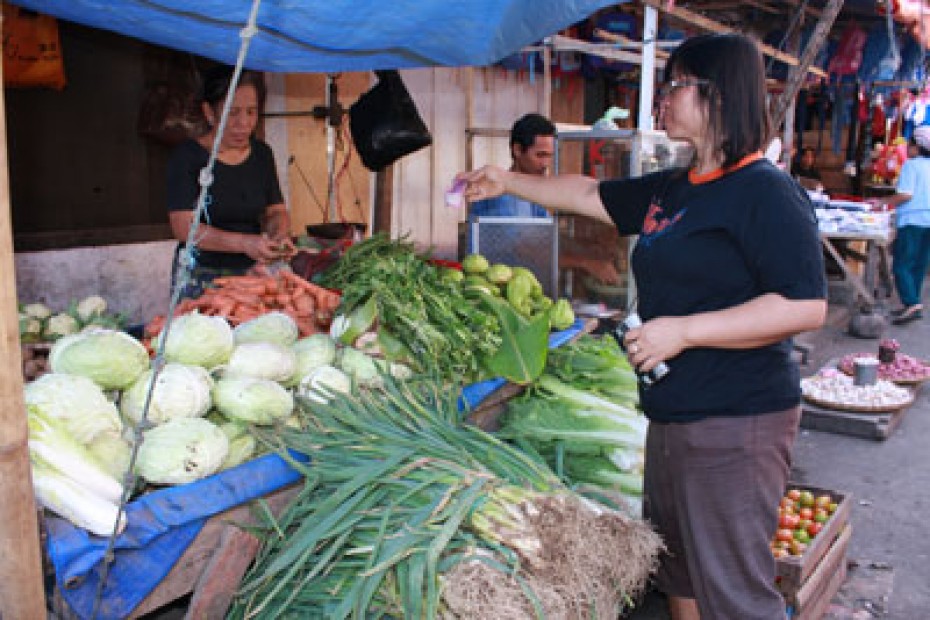
Selvie, a 41-year-old single parent, has been serving as the coordinator of Elohim Child Development Center for almost two years now.
During her first year at the center, Selvie had been facing obstacles, which came from both her own family and the community around the center.
She had to take care of her two children and her new enlarged family. Her husband had left her after 16 years and left her in anguish. She moved back to her parents’ house, where her two siblings along with their families had just moved in, too.
The community doubted whether Selvie would be able to manage the ministry. They thought it was her fault that her family had been broken.
Surrendering to God’s will is what Selvie has been doing as well as raising her children. She has two children; the oldest, Indriani Natalia, graduated from college few months ago and the youngest, Aldo Aprillio Samuel, is in fifth grade now.
Selvie has been spending up to 12 hours a day for the ministry since appointed to be the center coordinator. Her daily activities are more or less the same:
- shopping for the children’s meal
- going to the center to help the cook prepare the meals and to clean up the church
- checking the reports and the day’s scheduled program
- having praise and worship with children
- talking with parents
- coordinating with staff members after the activity
- going back home
Spend a day with Selvie
Continue Reading ›The Dignity of Work

I told you about my new neighbor, the Port-o-Let. One morning, a new big truck came pulling up outside my apartment, and this guy in a yellow vest hopped out.
Armed with a long hose, he proceeded to suck the contents out of the Port-o-Let. Quick as lightning, he hopped back in his truck and was off. Now he’s been showing up in his big green truck each week, happily performing his duty.
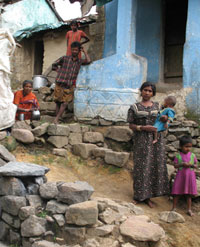 And it got me thinking. It’s easy for me to complain about the little parts of my job that bug me (like paperwork and deadlines and meetings). Watching this man gave me a new appreciation for my job. Not, by any means, that I think there is more dignity in what I do than what he does. I believe that there is dignity in the work that God has given each of us to do, no matter how our culture prompts us to view it.
And it got me thinking. It’s easy for me to complain about the little parts of my job that bug me (like paperwork and deadlines and meetings). Watching this man gave me a new appreciation for my job. Not, by any means, that I think there is more dignity in what I do than what he does. I believe that there is dignity in the work that God has given each of us to do, no matter how our culture prompts us to view it.
And learning more about the work others do around the world can give us a new perspective on our own work.
Ganesan, shown here with his family in front of his home in India*, works each day as a day laborer in other’s fields to feed his wife and two children.
Working as a day laborer is a common occupation of the parents of Compassion children, as most can’t afford to own land themselves and don’t have the education to seek other employment.
Ganesan earns about 450 Rupees a week for his work — about $10.
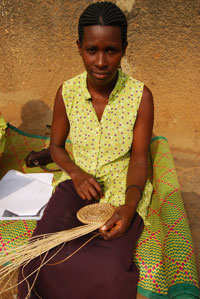
Resty is a proud mother of two in Uganda.
Her husband is an alcoholic, so a lot of the time she has to find ways to provide for her children by herself.
She hadn’t worked before, but through the Child Survival Program, she learned how to start a small business, selling charcoal by the roadside.
She gets about 20,000 Ugandan shillings a month selling charcoal — about $12.
She also learned to weave baskets through the CSP, and sells each basket she makes for about $1.
Ryan and Axl’s dads work as fishermen in Indonesia. (And, yes, that is as in Axl Rose. His dad liked rock music.)
Their fathers leave for the ocean on fishing expeditions and are gone from their family for six weeks at a time catching mackerel.
Each trip, they earn roughly 700,000 Indonesian Rupees — about $77.
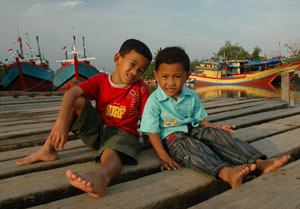
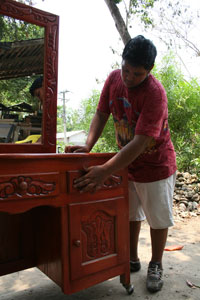 Where 17-year-old Ezequiel grew up in southern Mexico, the average worker earns $12 a week, working 20-hour days to harvest mangoes and bananas.
Where 17-year-old Ezequiel grew up in southern Mexico, the average worker earns $12 a week, working 20-hour days to harvest mangoes and bananas.
But Ezequiel’s dad is a carpenter who makes beautiful furniture.
At his Compassion child development center, Ezequiel learned how to carve wood, and together with their different skills, Ezequiel and his dad can make pieces like this dresser they just finished.
Once he graduates, a skilled woodworker like him can earn up to $55 a week, compared to the $12 of the day laborers harvesting mangoes.
In India, Suren and his wife, Rinu, both used to work full time in a brick factory. Suren lived in a dormitory at the factory, and Rinu would travel home each day to care for the family. Put together, they earned roughly 250 Indian Rupees a week — about $6 — for their family of six.
But Kajali (in the dark blue sweater) became sponsored, and her sponsors gave them a family gift, with which they bought a cycle van.
Now Suren earns many times over as a cycle van driver what he used to earn at the brick factory. When he was working at the factory and couldn’t provide a proper home for his family, Suren says, “as a parent, I felt worthless and of no good use.”
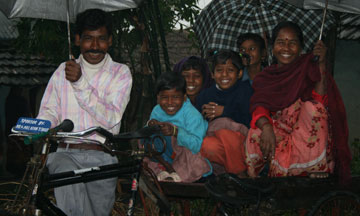
Those words tear my heart, and it’s sadly not the first time I’ve read the sentiment. How many mothers and fathers are out there, working so hard each day as farmers, drivers, and traders, scraping to provide just one or two meals for their children, and still feeling like failures?
Yet it’s so encouraging to know that even a small gesture can transform a family’s life. Suren is now filled with pride for the way he can care for his family. He says, “through Kajali and her beloved sponsor, we have now tasted of the goodness of God’s awesome power.”
<hr/ >
*NOTE FROM EDITOR: This content honors Compassion’s historical work in India. While we no longer have an India sponsorship program, we are grateful for the lives changed and meaningful work achieved through our sponsors and donors in our nearly 50 years there. For a detailed explanation of the end of our sponsorship program in India, please visit: compassion.com/india-update.
Continue Reading ›Non-Traditional Family Traditions
Many of Compassion’s sponsors are young families. Our family fits that category with children 9, 6, 5 and 2 years old. Not only do we want to help little ones overseas, my wife and I want our own children to realize the hope-stealing effects of poverty. We want our kids to understand poverty to a point where they’re compelled to do something about it both now and later.
Do you think this way? What traditions have you started in your own home to cultivate an understanding of what the poor go through in the developing world? We’re just starting out, and I know we can get more consistent, but here’s a glimpse of what we do:
-
- I made an 8-by-10 print of this picture taken by Tonny Tunya. It’s in our dining room. Occasionally, we pause to see whatever we’re facing through the bright eyes of these children whose playground is a garbage dump in Indonesia. At best, our conversations are speculative. But there’s truth in these talks, too. And our perspective is refined bit by bit.
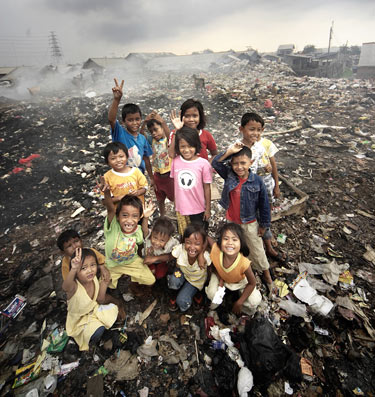
- When we sit down for a meal and make the effort to think about Karen, our sponsored child in the Philippines, and her family, our gratitude to God for the food in front of us grows deeper.
- We’re moving in the direction of connecting each one of our kids to a different sponsored child. They’ll get to minister and be ministered to through sharing words of hope, art and prayers. Who knows? Maybe our kids will be some of the few of their generation to have a true pen pal.
- I’m memorizing verses about children and the poor and my son is helping me. I hope that these scriptures sink in for him, too, and that seeing his dad take the time to do this would inspire him.
I’m sure there are many other ways to teach children about poverty through day-to-day life. I’ve heard of kids initiating fund raisers and families who rethink gift-giving at Christmas. Some of these families have even gone on one of Compassion’s sponsor tours to see it all with their own eyes.
Would you take a few moments to share your traditions? It’s OK if you don’t do them 100 percent of the time. None of us do. But we want to. And it’d be great to learn from others. The kids need it. Ours and theirs.


